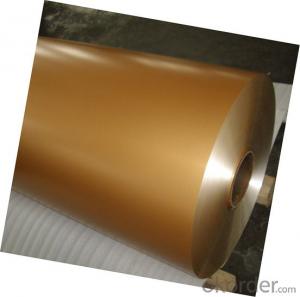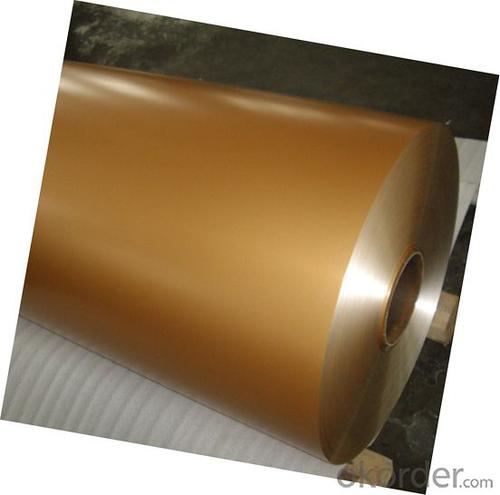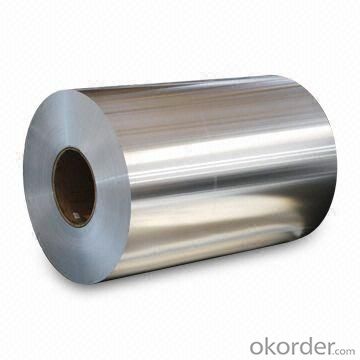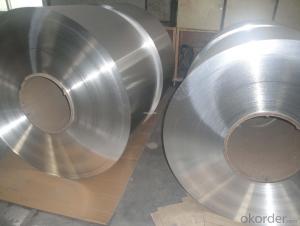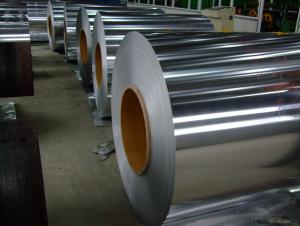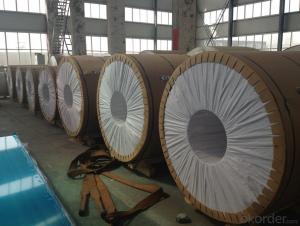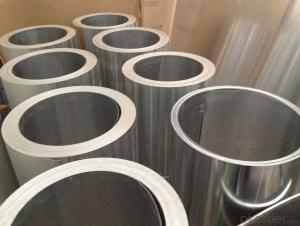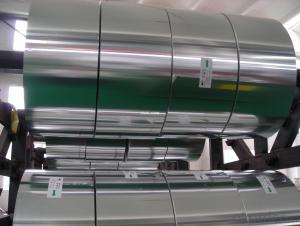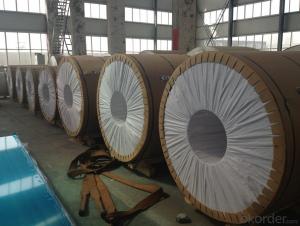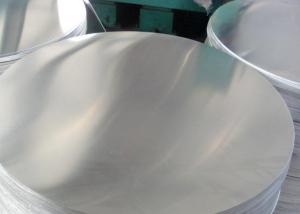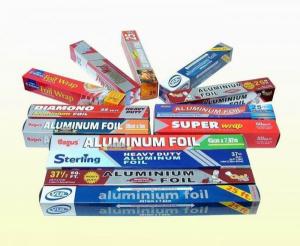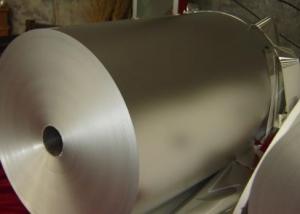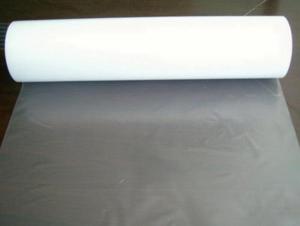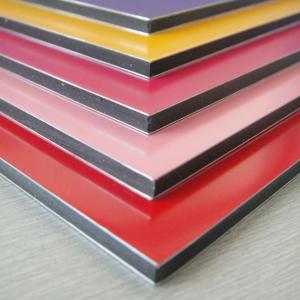Aluminum Coil for Gutter Manufactured in China
- Loading Port:
- Shanghai
- Payment Terms:
- TT OR LC
- Min Order Qty:
- 5 m.t.
- Supply Capability:
- 100000 m.t./month
OKorder Service Pledge
OKorder Financial Service
You Might Also Like
Specification
| Anodized Aluminum Coil | ||||
| Alloy No. | Thickness (mm) | Width (mm) | Temper | |
| A1050,A1060, A1070,A1100,A1235,A1245 | 0.2-3.0 | 20-2400 | O,H12,H22,H14,H24,H16,H26,H18 | |
| 3.0-12.0 | 20-2400 | H111,H112 | ||
| A3003,A3004,A3105 | 0.2-4.0 | 20-2400 | O,H12,H22,H14,H24,H16,H26,H18 | |
| 4.0-12.0 | 20-2400 | H111,H112 | ||
| A5052,A5083,A5754,A5005 | 0.2-4.0 | 20-2400 | O,H12,H22,H14,H24,H16,H26,H18 | |
| 4.0-12.0 | 20-2400 | H111,H112 | ||
| A6061,A6082,A6063 | 0.8-3.0 | 20-2400 | T6,T4,T651 | |
| A8011,A1145,A1235 | 0.005-0.2 | 20-1700 | O,H14,H18,H24 | |
| ID | 76mm,152mm,200mm,300mm,505mm | |||
| Packing : Export wooden pallets, wooden case | ||||
| Standards:ASTM-B209. EN573-1, GB/T3880.1-2006 | ||||
| Quality of material: totally free from defects like white rust, oil patches, roll marks, edge damage, camber, dents, holes, break lines, scratches and free from coil set | ||||
| Application : Mainly used insigns, billboards, building exterior decoration, bus body, high-rise buildings and factories wall decoration, kitchen sink, lamp, fan leaves, with pieces of electronic, chemical equipment, sheet metal processing parts, deep drawing or spinning hollowware, welding parts, heat exchangers, bell surface and disk, plate, kitchenware, decorations, reflective devices, ect | ||||
| MOQ | 2.5 tons | |||
| Payment term: | TT,L/C | |||
| Delivery Time | 20 days after 30% TT payment or receiving L/C copy | |||
| Kind attention : Specifications can be customized as the customer’s requirements. | ||||
Company Information
CNBM is in aluminum foil, coil, sheet, plate for more than 10 years, thus we have rich product, technology and market experiences. With the world’s top aluminum processing equipments, experienced technical staff, cooperative and professional sales team, and the enterprise concept of responsibility and sharing, we have been widely focused since the day set up, and has gained high praise from customers home and abroad until now.
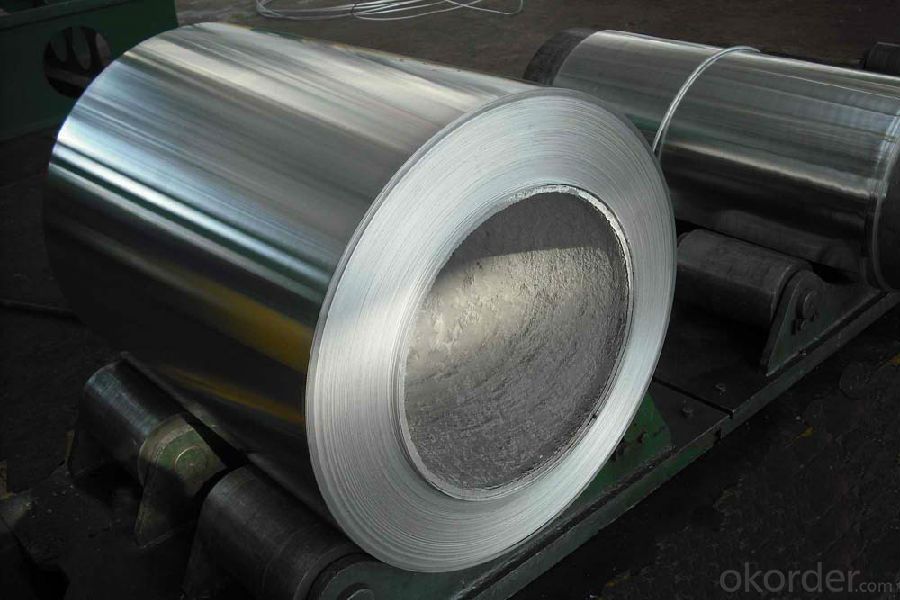
We specially produce and sell all kinds of aluminum foil, coil, sheet and plate with different sizes and applications. For Foil product, the main gauge ranged from 0.006mic to 0.10mm, and width ranged from 200mm to 2000mm. Alloys are 1235/ 1050/1060/1200/8079/8011/8006 etc, and ID is 76mm, 152mm. The main application includes flexible package, cigarette foil, golden card foil, pharmaceutical foil, household foil, container foil, air conditioner foil, lid foil, beer mark foil etc. We also can supply aluminum coil, strip, sheet and plate in alloy of 1000 series, 3000 series, 5000 series, 6000 series and 8000 series etc.
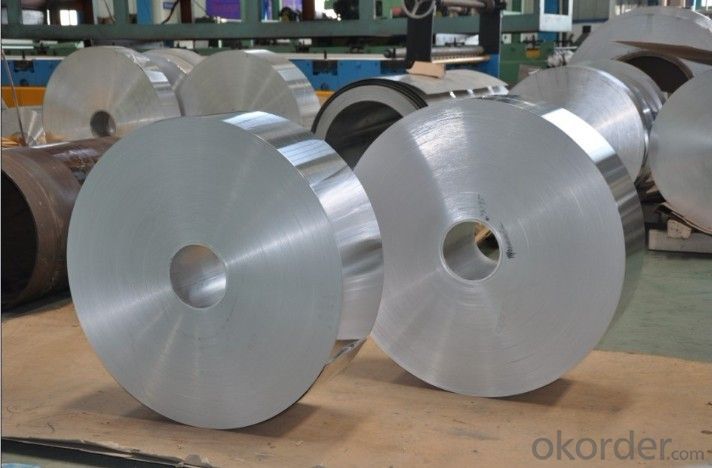
CNBM has passed ISO9001 and ISO14001 successfully, and also approved by American Food and Drug Administration (FDA). By the good product quality and professional service, we have set up a complete sales network. Until now, our products has exported to more than 20 countries and regions including Europe, USA, Canada, Brazil, Southeast Asia and middle east etc.
Our main products for aluminum coils are as follows:
Commodity | Alloy | Temper | Thickness /mm | Width /mm | |
Base material | 1235 1200 1140 8*** | H14 H18 | 0.25-1.00 | 950-1340 | |
Coil for PS | 1050 1060 | H18 | ≥0.2 | 830/920 1030/1050 | |
Sheets for PS | 1050 1060 1070 | H18 | 0.13-0.3 | 650-1300 | |
Strip for venetian blinds | 5052 | H19 | 0.13-0.3 | 300-1300 | |
Coils for composite panels | 1100 3003 3005 | H18/HX2 HX4/HX6 HX8 | 0.03-1.0 | 1000-1300 | |
Coils for other uses | 1100 1235 3004 5052 8011 | H14 H18 H24 O | 0.3-0.4 | 1000-1600 | |
Sheets/Strips for other uses | 5052 | O/H32/H34 | 0.07-2.0 | 950-1550 | |
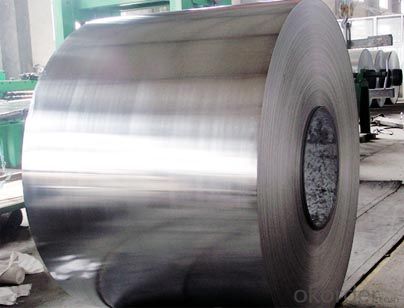
Our Services
CNBM is ready to assist with any product needs or enquiries. We value our customers and welcome your thoughts and feedback.
Please send comments, questions and requests through alibaba or our personal contact so they can be directed to the appropriate department.
About samples: Based on our company rules, a few samples are willing to be offered, but clients are requested to pay freight.
Working time:9:00~17:30(GM+8) from Monday to Friday, but you also can contact with us via personal contact information during our leisure time. We will try our best to offer you service in 24*7 hours.
Any quality, quantity problems are occured, response you will get in time not over more 24 hours after we recieve your complains. Problems will be solved in one week throught friendly negotiation.
- Q: Is aluminum a suitable material for use in electronic equipment?
- <p>Yes, aluminum is widely used in electronic equipment due to its excellent electrical conductivity, lightweight nature, and high thermal conductivity. It is commonly used in heat sinks, cases, and connectors. However, it is not as conductive as copper, so it is often used in applications where its other properties are more critical. Additionally, aluminum's corrosion resistance makes it a durable choice for various electronic components.</p>
- Q: Is aluminum a suitable material for manufacturing bicycles and other lightweight vehicles?
- <p>Yes, aluminum is a popular material for making bicycles and other lightweight vehicles due to its high strength-to-weight ratio. It is lightweight, durable, and resistant to corrosion, which makes it an excellent choice for components that need to be strong yet not add excessive weight. Aluminum frames are commonly used in bicycles because they offer a good balance between weight, stiffness, and cost. Additionally, aluminum is widely used in the manufacturing of other lightweight vehicles such as electric scooters, small cars, and even aircraft due to its favorable properties.</p>
- Q: Is it possible to join aluminum pieces together using welding techniques?
- <p>Yes, aluminum can be welded. Welding aluminum is a common practice in various industries due to its lightweight and corrosion-resistant properties. Techniques such as Gas Metal Arc Welding (GMAW), Gas Tungsten Arc Welding (GTAW), and Shielded Metal Arc Welding (SMAW) are used. However, aluminum welding requires specific precautions, such as using a clean, dry surface and a proper shielding gas to prevent oxidation, as aluminum readily reacts with oxygen.</p>
- Q: This question asks about the methods to determine the safety of a specific brand's aluminum products.
- <p>To determine if a particular brand of aluminum products is safe to use, one should look for certifications and standards compliance. Check if the brand has certifications such as ISO 9001 for quality management systems or specific safety certifications relevant to aluminum products. Look for compliance with safety standards like ANSI, ASTM, or EN standards. Additionally, research customer reviews and testimonials, and consider third-party lab testing results. It's also important to inquire about the manufacturing process to ensure it adheres to environmental and health safety regulations. Lastly, consult with industry experts or regulatory bodies for their assessment of the brand's safety practices.</p>
- Q: Is it possible to recycle aluminum cans to create new ones?
- <p>Yes, old aluminum cans can be recycled to make new ones. The recycling process for aluminum is highly efficient and environmentally friendly. Aluminum cans are collected, sorted, and then shredded into small pieces. These pieces are melted down in a furnace, and the molten aluminum is poured into molds to create new cans. This process uses only 5% of the energy required to produce aluminum from raw materials, making it a sustainable and cost-effective method of production.</p>
- Q: What are the differences between Aluminum Oxide and Aluminum Alloy in terms of their properties and applications?
- <p>Aluminum Oxide and Aluminum Alloy are distinct materials with different properties and uses. Aluminum Oxide, also known as alumina, is a ceramic material with a high melting point, hardness, and electrical insulation properties. It's used in abrasives, electronics, and as a refractory material. In contrast, Aluminum Alloys are composites of aluminum with other elements like copper, magnesium, or silicon, which enhance their strength, corrosion resistance, and malleability. They are widely used in construction, automotive, aerospace, and packaging due to their lightweight and durability.</p>
- Q: The question seeks to understand the steps involved in producing aluminum, from raw material extraction to the final product.
- <p>The process of aluminum production involves several key steps. Initially, bauxite, the primary aluminum ore, is mined. This ore is then crushed and washed to remove impurities. The next phase is the Bayer Process, where bauxite is dissolved in a caustic soda solution under high temperature and pressure, resulting in a solution rich in aluminum hydroxide. This solution is then seeded with aluminum hydroxide crystals, causing more crystals to form, which are then harvested. The final step is the Hall-H茅roult Process, where the aluminum oxide is dissolved in a molten cryolite bath and electrolyzed to extract pure aluminum. This process involves passing an electric current through the bath, causing aluminum ions to be reduced at the cathode, forming molten aluminum which is then tapped off for further processing or use.</p>
- Q: What are some environmentally friendly options that can replace aluminum in various applications?
- <p>Sustainable alternatives to aluminum include biodegradable materials like bamboo and hemp, which can be used in construction and packaging. Stainless steel is a recyclable metal that can replace aluminum in many applications due to its durability and strength. Recycled aluminum itself is a sustainable option as it requires less energy to produce than new aluminum. Additionally, magnesium and titanium are lightweight metals that can be used in place of aluminum in certain industries. It's important to consider the specific application when choosing an alternative, as each material has its own set of properties and environmental impacts.</p>
- Q: Jiangsu in addition to the 10000 aluminum factory, there are no other aluminum factory?
- Jiangyin Xinyu company specializing in the production of various types of building Aluminum Alloy industrial profiles, A Well-Known Trademark in China, national inspection, Jiangsu famous brand, my ID address after the two to 52 is my mobile phone number, welcome to contact with us, thank you!
- Q: Explain how aluminum influences the synthesis and function of neurotransmitters.
- <p>Aluminum has been suggested to affect the production of neurotransmitters by potentially disrupting the normal functioning of enzymes and receptors involved in neurotransmitter synthesis and release. It may interfere with the uptake of essential metals like magnesium and zinc, which are crucial for the proper functioning of neurotransmitter systems. Aluminum can also alter the permeability of cell membranes, affecting the transport of neurotransmitters across the synaptic cleft. Additionally, there is evidence that aluminum may contribute to oxidative stress, which can impair the synthesis and function of neurotransmitters. However, it's important to note that the exact mechanisms are not fully understood, and more research is needed to establish a definitive link between aluminum exposure and neurotransmitter dysfunction.</p>
Send your message to us
Aluminum Coil for Gutter Manufactured in China
- Loading Port:
- Shanghai
- Payment Terms:
- TT OR LC
- Min Order Qty:
- 5 m.t.
- Supply Capability:
- 100000 m.t./month
OKorder Service Pledge
OKorder Financial Service
Similar products
Hot products
Hot Searches
Related keywords
